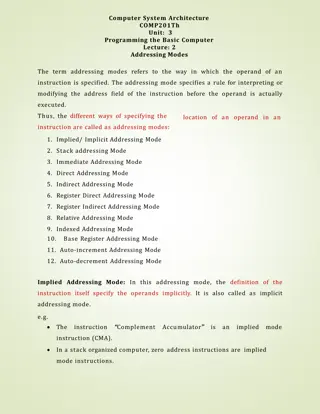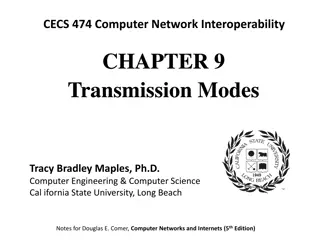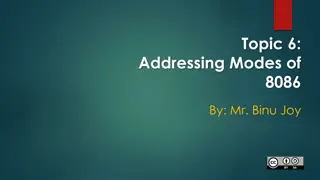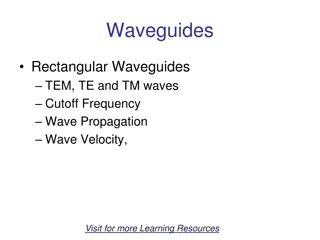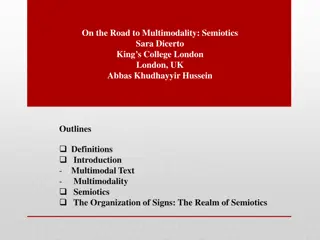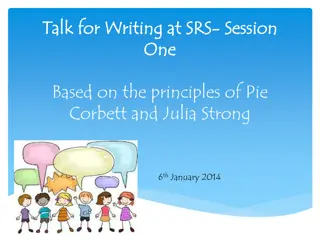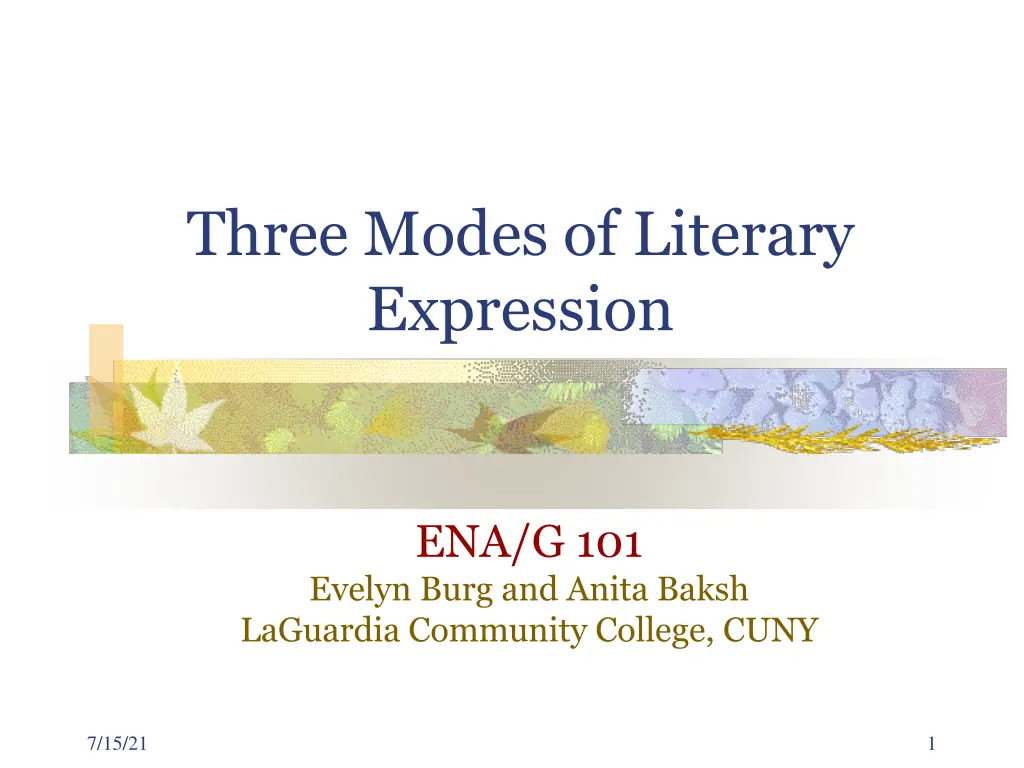
Modes of Literary Expression: Narrative, Exposition, Argument
Explore the three modes of literary expression - Narrative, Exposition, Argument. Understand how each type functions, where they are found, and view examples to grasp their significance in writing. Enhance your knowledge of different writing styles to improve your own writing skills.
Download Presentation

Please find below an Image/Link to download the presentation.
The content on the website is provided AS IS for your information and personal use only. It may not be sold, licensed, or shared on other websites without obtaining consent from the author. If you encounter any issues during the download, it is possible that the publisher has removed the file from their server.
You are allowed to download the files provided on this website for personal or commercial use, subject to the condition that they are used lawfully. All files are the property of their respective owners.
The content on the website is provided AS IS for your information and personal use only. It may not be sold, licensed, or shared on other websites without obtaining consent from the author.
E N D
Presentation Transcript
Three Modes of Literary Expression ENA/G 101 Evelyn Burg and Anita Baksh LaGuardia Community College, CUNY 7/15/21 1
One can divide writing into three general types: Narrative Exposition Argument 2
Narrative What does a narrative do? Tells a story Uses characters Expresses a point of view Presents a chronology (i.e., linear, circular, flashback) Appeals to emotion via identification 3
Where is narrative found? Autobiography Biography Journalism Novels Poetry Short stories Dramas 4
Narrative Example #1 I was born in Tuckahoe, near Hillsborough, and about twelve miles from Easton in Talbot County, Maryland. I have no accurate knowledge of my age . . . I have never met a slave who could tell of his birthday. . . A want of information concerning my own was a source of unhappiness to me even during childhood. Frederick Douglass in his Narrative of the Life of Frederick Douglass 5
Narrative Example #2 The town seemed empty and quiet when I arrived. That was because everyone had left what they were doing and taken off to the house on Hill Side to see for themselves what was happening. Even though Paradise is spreading out, inch by inch, and taking over the sugar cane fields that surround it, it remains one of the smaller towns in Lantacamara, so small that merely the news of one stranger passing through can be enough to ignite a wildfire of curiosity. Shani Mootoo s Cereus Blooms at Night 6 =
Exposition/Expository Writing What does it do? Delivers information - explanatory Impersonal --Tends to have an objective tone Discursive order (topic to topic) Appeals to interest practical, intellectual, and personal (i.e., an interest in the subject or a motive to learn it) 7
Where do we find exposition? Journalism Non-fiction Instruction manuals Textbooks Encyclopedias 8
Expository Writing Example #1 Between 1975 and 1994, 150,000 Cambodian refugees were resettled in the United States . . . These were the years of a major Southeast Asian resettlement program- the largest such program in the nation s history- which granted asylum to nearly 1 million refugees from the wars in Vietnam, Cambodia, and Laos. Eric Tang s Unsettled 9
Expository Writing Example #2 Though it wouldn t have changed Henrietta s treatment, this new diagnosis could help explain why the cancer spread throughout her body so much faster than her doctors expected. Cervical adenocarcinomas are often more aggressive than epidermoid. (her syphilis could have been a factor as well syphilis can suppress the immune system and allow cancer to spread faster). Rebecca Skloot s The Immortal Life of Henrietta Lacks 10
Argument How does it work? Persuasive Assumes a possible opposing view Presents a thesis, premises and a conclusion Systematic Appeals to logic,in that the conclusion can be reasoned deductively or inductively from the premises independent of opinion Appeals to emotion in argument form are considered propaganda 11
Where do we find argument? Scholarly writing Journalism Legal briefs Advertising Political debate Scientific proofs 12
Argument Example #1: Aristotelian deductive argument: All men are mortal. Socrates is a man. Therefore, Socrates is mortal. 13
Argument Example #2: What Meletus? Do you mean to say that you, who are so much younger than I , are yet so much wiser, in that you know that bad citizens always do evil, and that good citizens do good, to their neighbors, while I am so extraordinarily ignorant as not to know that if I make any of my companions evil, he will probably injure me in some way? And you allege that I do this voluntarily? You will not make me believe that or anyone else either, I should think. Socrates, from Plato s Apology 14
Argument Example #3: In any nonviolent campaign there are four basic steps: collection of the facts to determine whether injustices exist; negotiation; self-purification; and direct action. We have gone through all these steps in Birmingham . . . racial injustice engulfs this community. Birmingham is probably the most thoroughly segregated city in the United States . . . Negroes have experienced grossly unjust treatment in the courts. There have been more unsolved bombings of Negro homes and churches in Birmingham than in any other city in the nation . . . freedom is never voluntarily given by the oppressor; it must be demanded by the oppressed. Martin Luther King s Letter from Birmingham Jail 15
Actually, all writing is really a mixture of these elements, with a greater emphasis on one or the other. For example, Frederick Douglass calls his book a narrative, but it is intended as an argument against slavery. Al Gore s An Inconvenient Truth mixes biographical narrative, scientific exposition and journalism; but it has been seen and used as a political argument as well. Socrates apology is both a narrative, an explanation of his life and an argument for such a life. 16
So, now try to recognize those types of expression in your readings. Once you do, think about why the author chose that method? What ideas were they trying to get across? 17
Works Cited Douglass, Frederick. Narrative of the Life of Frederick Douglass: An American Slave Written by Himself. 1856, Edited by David W. Blight, Bedford Books, 1993. King, Dr. Martin Luther. "Letter from a Birmingham Jail" 16 April 1963. African Studies Center, University Of Pennsylvania, www.africa.upenn.edu/Articles_Gen/Letter_Birmingham.html. Mootoo, Shani. Cereus Blooms at Night. Press Gang Publishers, 1996. Plato. Euthyphro, Apology and Crito and the Death Scene from Phaedo. Translated by F.J. Church and Introduction by Robert D. Cumming, Bobbs-Merrill Company, 1956. Skloot, Rebecca. The Immortal Life of Henrietta Lacks. Crown Publishers, 2010. Tang, Eric. Unsettled. Temple University Press, 2015. 18


